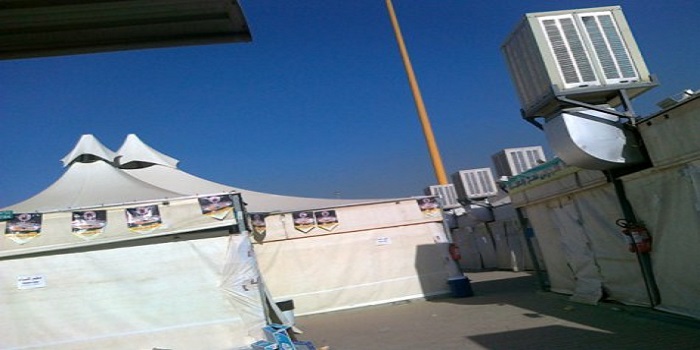Some South African hujjaj will have to waiver the luxury of air conditioners at their camps on the day of Arafat after a decision made by hajj operators, which the South African Hajj and Umrah Council (Sahuc) believes was not a good move. Given the expected temperatures in the Kingdom of Saudi Arabia during the days of hajj, hujjaaj will face a difficult task, compounded by the fact that the non-special services camps site, Camp C, which was chosen by South African hajj operators, will not have air conditioners.
Speaking to VOC, Sahuc president, Shaheen Essop said in March this year, the regulator discussed with the Mu’assasah the prices for the various camps. The Mu’assasah in turn forwarded the new price-lists and an outline of the various services that will be on offer to hajj operators.
He says that while Sahuc is involved in the process of hajj on the ground, the types of camps that is allocated to the hujjaaj is considered an additional service.
Essop notes that the basic camp, Camp C, was negotiated from SR 12 00 down to SR 900, and with the exception of the supplementary food that is accommodated for on the Day of Arafat, the costs excludes air-conditioning.
He says that Camp B Plus, which priced at SR 1 250, includes a water cooler in the camps on Arafat, which tests have proven to reduce temperatures from 40°C to 25°C and 30°C.
“We urged all operators to consider these particular camps, to ensure that the people find it comforting on the Day of Arafat,” Essop stated.
The issuing of air-conditioning in low cost camps began in 2015, where it was previously only available in special services camps that are considered to be quite expensive.
“The reason for this is to ensure that people understand that the heat is going to be quite excessive. Last year in Arafah alone, our medical personal administered over 240 drips to re-hydrate people. That says that people are down from heat and exhaustion.”
As instructed by the Mu’assasah, Essop says that operators were not permitted to choose from both types of camps. Instead, for logical reasons, were only permitted to choose either one or the other.
“Notwithstanding this information, the operators were given the choice and all operators in South Africa indicated that they don’t want to make use of Camp B Plus, they chose to use Camp C because of the cost that the hujjaaj would incur,” Essop asserts.
He says that Sahuc cannot force hujjaaj to pay for the service if they are unable to pay the extra costs, financial constraints that he asserts was reflected in the overall dropout of accredited hujjaaj.
“We have seen a 60 per cent dropout in our accreditation. This is as a result of people not being able to afford hajj packages or their circumstances have changed. To impose an additional SR300 – 400 would make it difficult for them.”
Given the confusion surrounding the issue of air-conditioned camps, he affirms that Sahuc has engaged with operators, prior to departing for Saudi, at each step in the process and encouraged them to reconsider changing their packages to include the air-conditioned camps.
“We even had one of our doctors, Dr Salim Parker, who serves the hujjaaj every year, put a note out from a medical position and supplied the information to the operators.”
Essop explains that in light of the lack of electricity at Camp C, Sahuc will assist operators in trying to mitigate the effects of the soaring temperatures.
Taking into consideration the terrain of the plain of Arafat and the fact that the area is only used on one day of the year, he says that basic services is sparse in the area.
“Electricity and water is limited. So, it becomes difficult and dangerous to do something at the 11th hour. There are also certain requirements from different divisions of safety and security in the Kingdom that needs to be put in place – hence the discussions that took place in March,” Essop continued.
In preparation for the days of hajj, Essop urges all hujjaaj to remain hydrated, which in the past five years has proven vital to ensuring an incident-free hajj.
Sathoa’s Sedick Steenkamp will respond on Thursday.
VOC






 WhatsApp us
WhatsApp us 

